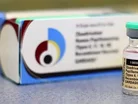HPV vaccine to be made cheaper in developing countries

The HPV (human papilomavirus) vaccine has been made more affordable and more accessible to those in developing countries after having its price cut.
Gardasil is a HPV vaccine which protects against the most common forms of the virus, which is responsible for causing cervical cancer.
Merck, the drug company who manufacturers Gardasil, has pledged to sell the vaccine at a lower price to the Global Alliance for Vaccines and Immunisation (GAVI).
READ MORE FROM THE WDM CONTENT NETWORK:
To read the latest edition of Healthcare Global, click here
- Parents need to be vigilant in spotting brain tumours
- Smart bandage changes colour to track healing wounds
- Pomegranate juice relieves work-related stress
The GAVI is made up of both private and public health organisations who together and work towards making drugs, vaccinations and immunisations more accessible in developing countries.
In a move desined to prevent incidences of cervical cancer on a global level, the Gardasil HPV vaccine will now be sold at a 67 percent lower cost to the GAVI; US$5 per dose.
Eighty-eight percent of cases of cervical cancer are seen in developing countries; hence the push for a cheaper vaccine in these parts of the world.
“These are promising offers that demonstrate industry commitment to work towards affordable and sustainable prices for life-saving vaccines in developing countries,” said Helen Evans from GAVI.
“We will continue to drive for sustainable prices, while ensuring procurement of innovative, appropriate, quality vaccines to meet GAVI country needs.”
With little or no access to screening or treatments, in third world countries cervical cancer is thought to be one of the top two cancers found in women.
It is hoped that if the accessibility to treatments is improved, developing countries will see the same decrease in cervical cancer related deaths as developed countries have in recent years.
There are currently pilot programmes of the HPV vaccine in 20 countries across the world; including Peru and Uganda.
They have shown that the immunisation treatment is being well-received and valued in such countries and it can be both safely and affordably delivered.
